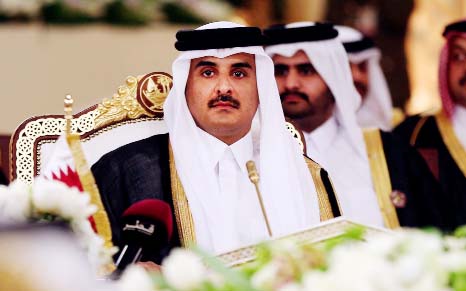
The Telegraph :
Qatar has defied Saudi Arabia by strengthening its diplomatic ties with Iran – rather than cutting them back as Saudi Arabia and its allies have demanded.
Saudi Arabia and three other Arab states have been blockading Qatar since early June and have demanded that Qatar curb its ties with Iran, as well as shut down its al-Jazeera television network and expel extremists from its territory.
Rather than give in to the blockading countries’ demands, Qatar announced on Thursday that it was restoring full diplomatic relations with Iran and sending its ambassador back to Tehran for the first time since 2016.
“The state of Qatar expressed its aspiration to strengthen bilateral relations with the Islamic Republic of Iran in all fields,” The Qatari foreign ministry said.
There was no immediate response from Saudi Arabia or its allies in Bahrain, UAE and Egypt to the diplomatic move.
The act of defiance came amid suspicions among Qatar’s leaders that Saudi Arabia might be trying to engineer a palace coup against its emir, Tamim bin Hamad al-Thani.
Their fears were raised after Saudi Arabia’s powerful crown prince, Mohammed bin Salman, met with an obscure Qatari royal for in Jeddah last week.
The royal, Abdullah al-Thani, has no role in the Qatari government and is from a branch of the royal family that was pushed out of power during a 1972 coup.
Abdullah had previously lived in Saudi Arabia and at the meeting spoke warmly of “brotherly relations rooted in history” between the two countries.
Prince Mohammed responded by opening the Saudi land border to Muslim pilgrims from Qatar who wanted to make the Hajj journey to Mecca, and offering to fly other pilgrims directly to Saudi Arabia.
The unusual meeting between the powerful Saudi and the little-known Qatari quickly prompted suspicions in Doha that Prince Mohammed might be hoping to install Abdullah or someone else from his family as Qatar’s new leader.
Gerd Nonneman, a professor of International Relations and Gulf Studies at Georgetown University in Qatar, said the meeting was more likely intended as a “propaganda ploy” by Saudi Arabia intended to “needle the Qatari leadership”.
While Saudi Arabia and Iran are archrivals – and are opposing sides in conflicts across the Middle East – there are some indications of a slight thaw.
The two countries foreign ministers met recently and the two sides are planning mutual diplomatic visits next month for the first time since January 2016.
Diplomatic relations collapsed after Iranian protesters stormed the Saudi embassy in Tehran in protest at Saudi Arabia’s execution of a prominent Shia cleric. Both sides withdrew their diplomats during the crisis and Qatar pulled out its own ambassador in solidarity with Saudi Arabia.
A group of Saudi diplomats will visit Tehran to inspect the country’s embassy there while a group of Iranians will do the same in Riyadh.
Qatar has defied Saudi Arabia by strengthening its diplomatic ties with Iran – rather than cutting them back as Saudi Arabia and its allies have demanded.
Saudi Arabia and three other Arab states have been blockading Qatar since early June and have demanded that Qatar curb its ties with Iran, as well as shut down its al-Jazeera television network and expel extremists from its territory.
Rather than give in to the blockading countries’ demands, Qatar announced on Thursday that it was restoring full diplomatic relations with Iran and sending its ambassador back to Tehran for the first time since 2016.
“The state of Qatar expressed its aspiration to strengthen bilateral relations with the Islamic Republic of Iran in all fields,” The Qatari foreign ministry said.
There was no immediate response from Saudi Arabia or its allies in Bahrain, UAE and Egypt to the diplomatic move.
The act of defiance came amid suspicions among Qatar’s leaders that Saudi Arabia might be trying to engineer a palace coup against its emir, Tamim bin Hamad al-Thani.
Their fears were raised after Saudi Arabia’s powerful crown prince, Mohammed bin Salman, met with an obscure Qatari royal for in Jeddah last week.
The royal, Abdullah al-Thani, has no role in the Qatari government and is from a branch of the royal family that was pushed out of power during a 1972 coup.
Abdullah had previously lived in Saudi Arabia and at the meeting spoke warmly of “brotherly relations rooted in history” between the two countries.
Prince Mohammed responded by opening the Saudi land border to Muslim pilgrims from Qatar who wanted to make the Hajj journey to Mecca, and offering to fly other pilgrims directly to Saudi Arabia.
The unusual meeting between the powerful Saudi and the little-known Qatari quickly prompted suspicions in Doha that Prince Mohammed might be hoping to install Abdullah or someone else from his family as Qatar’s new leader.
Gerd Nonneman, a professor of International Relations and Gulf Studies at Georgetown University in Qatar, said the meeting was more likely intended as a “propaganda ploy” by Saudi Arabia intended to “needle the Qatari leadership”.
While Saudi Arabia and Iran are archrivals – and are opposing sides in conflicts across the Middle East – there are some indications of a slight thaw.
The two countries foreign ministers met recently and the two sides are planning mutual diplomatic visits next month for the first time since January 2016.
Diplomatic relations collapsed after Iranian protesters stormed the Saudi embassy in Tehran in protest at Saudi Arabia’s execution of a prominent Shia cleric. Both sides withdrew their diplomats during the crisis and Qatar pulled out its own ambassador in solidarity with Saudi Arabia.
A group of Saudi diplomats will visit Tehran to inspect the country’s embassy there while a group of Iranians will do the same in Riyadh.

